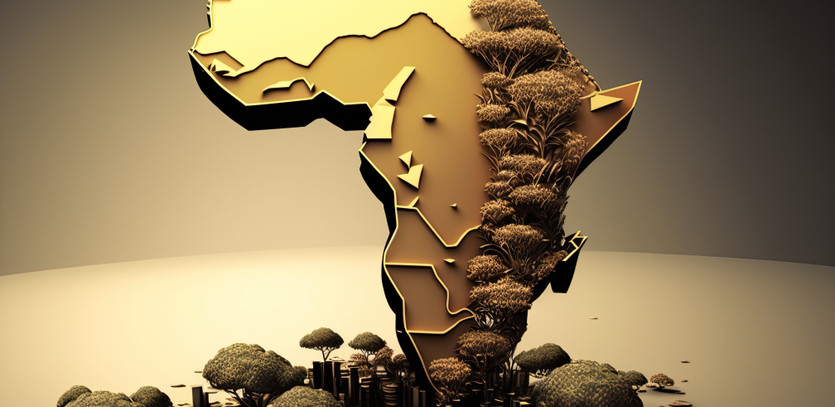An Emerging African Economy
Africa, often referred to as the "cradle of civilization", is swiftly turning into a go-to hub for budding market investors. Since the turn of the 21st century, Africa has been home to many of the world's quickest growing economies, as reported by the World Economic Forum. This narrative focuses on the profound transformation of Africa's economic landscape since 2000, offering glimpses of its promising future.
The Secret Sauce to Africa's Rising Economy
-
Robust Resources: Africa boasts a wealth of natural resources, ranging from oil and natural gas - making up 12% of global reserves, to colossal reserves of gold, platinum, uranium, cobalt, and diamonds. Moreover, Africa possesses approximately 60% of the world's fertile land, although as of a 2019 McKinsey report, only a fraction of its agricultural potential is being tapped.
-
A Flourishing Workforce: Africa is rich in an eager, affordable labor force, undergoing a demographic shift that leans towards a youthful population. This surge of young, aspiring Africans in their 20s and 30s with fewer dependents signifies an abundant workforce set to influence the next decade.
-
Political Stability: The governance landscape in Africa has seen remarkable stability. Former conflict-ridden countries have turned their narratives around, demonstrating successful governance and thriving economies. Trade relations have improved and the business environment has never been better.
Economic Growth Trajectory in Africa
By 2030, the World Economic Forum projects that nearly half of Africans will be middle to upper-class citizens, creating a greater demand for products and services. Household consumption is expected to reach a staggering $2.5 trillion, more than double the figure of 2015 which stood at $1.1 trillion.
The primary beneficiaries of this spending spree will be Nigeria (20%), Egypt (17%), and South Africa (11%). However, other countries such as Algeria, Angola, Ethiopia, Ghana, Kenya, Morocco, Sudan, and Tunisia are likely to attract corporations aiming to break into fresh markets. The sectors projected to witness the most growth by 2030 include food and beverages, education and transportation, housing, consumer goods, hospitality and recreation, healthcare, financial services, and telecommunications.
Interesting Fact: Nigeria, with a GDP of $514 billion USD in 2021, holds the title of the largest African economy, followed closely by Egypt at $394 billion.
Investing in the African Stock Market
Investors in Sub-Saharan Africa have access to around 29 stock exchanges representing 38 countries, including two regional exchanges. These exchanges vary greatly in size and trading volume.
Africa hosts a selection of prominent exchanges along with several emerging and smaller exchanges characterized by their limited trading volumes and a small number of listed stocks. Efforts are underway across all countries to stimulate their exchanges by enhancing investor education and confidence, easing access to funds, and standardizing procedures for transparency.
The Investment Pathways
-
Mutual Funds or Exchange-Traded Funds (ETFs): For novice investors or those aiming to make a small investment, opting for mutual funds or ETFs can be a wise decision. These funds allow investors to track a broad selection of companies operating in the region, providing a level of diversification.
-
American Depositary Receipts (ADRs): Experienced investors may consider ADRs, securities that represent shares in a foreign company and enable US investors to participate in African stocks within a US-based stock market.
-
Direct Access: Investing directly in African stocks is also possible but it comes with its own set of risks. Investing in foreign securities can expose US investors to unexpected taxes, currency risks, and potentially less regulated environments.
Interesting Fact: The Johannesburg Stock Exchange (JSE) holds the crown as Africa's largest stock exchange in terms of market capitalization.
Prominent ETFs and Mutual Funds
Here are some of the well-known ETFs and Mutual Funds:
-
VanEck Africa Index ETF (AFK): This ETF tracks some of the biggest and most liquid stocks in Africa with top allocations to South Africa, Morocco, and Nigeria.
-
iShares MSCI South Africa Index (EZA): It focuses primarily on mid-sized and large companies in South Africa within the financial, consumer discretionary, and telecommunication services sectors.
-
Market Vectors Egypt Index ETF (EGPT): This fund provides access to Egypt, Africa's third-largest economy, with a portion of the fund allocated to diversify across Luxembourg, Canada, and Ireland.
-
T. Rowe Price Africa and Middle East Fund (TRAMX): This fund mainly invests in banks and companies operating in Africa and the Middle East.
-
Commonwealth Africa Fund (CAFRX): Launched in 2011, it invests mainly in equity and debt securities of African companies in the manufacturing and mining sectors.
Diversifying with ADRs
ADRs provide a convenient avenue for US investors to trade selected African stocks. Prominent ADRs include AngloGold Ashanti (AU), DRD Gold (DRD), Gold Fields (GFI), Harmony Gold (HMY), Randgold (RNDFX), Sibanye Gold, Sasol (SBSW), and MiX Telematics (MIXT).
The Investment Landscape
Investors eyeing diversification in their portfolios often turn towards African investments. Over the past decade, China has led in terms of Foreign Direct Investment (FDI) in Africa, followed by the United States and France.
Investing in African Real Estate
African real estate presents potential for rapid growth, particularly in cities focusing on technological and industrial development. An investment strategy worth considering is a Real Estate Investment Trust (REIT), which operates like mutual funds for the real estate market.
China's Role in Africa
China is making significant investments in Africa as part of the One Belt and One Road initiative, aiming to improve trade and industrial connectivity throughout Africa and Asia.
Conclusion: Looking Towards the Future
Despite its tumultuous past, Africa is emerging as an economic titan. With a growing middle class and expanding local companies, several African nations appear to be on the brink of a significant growth trajectory.





